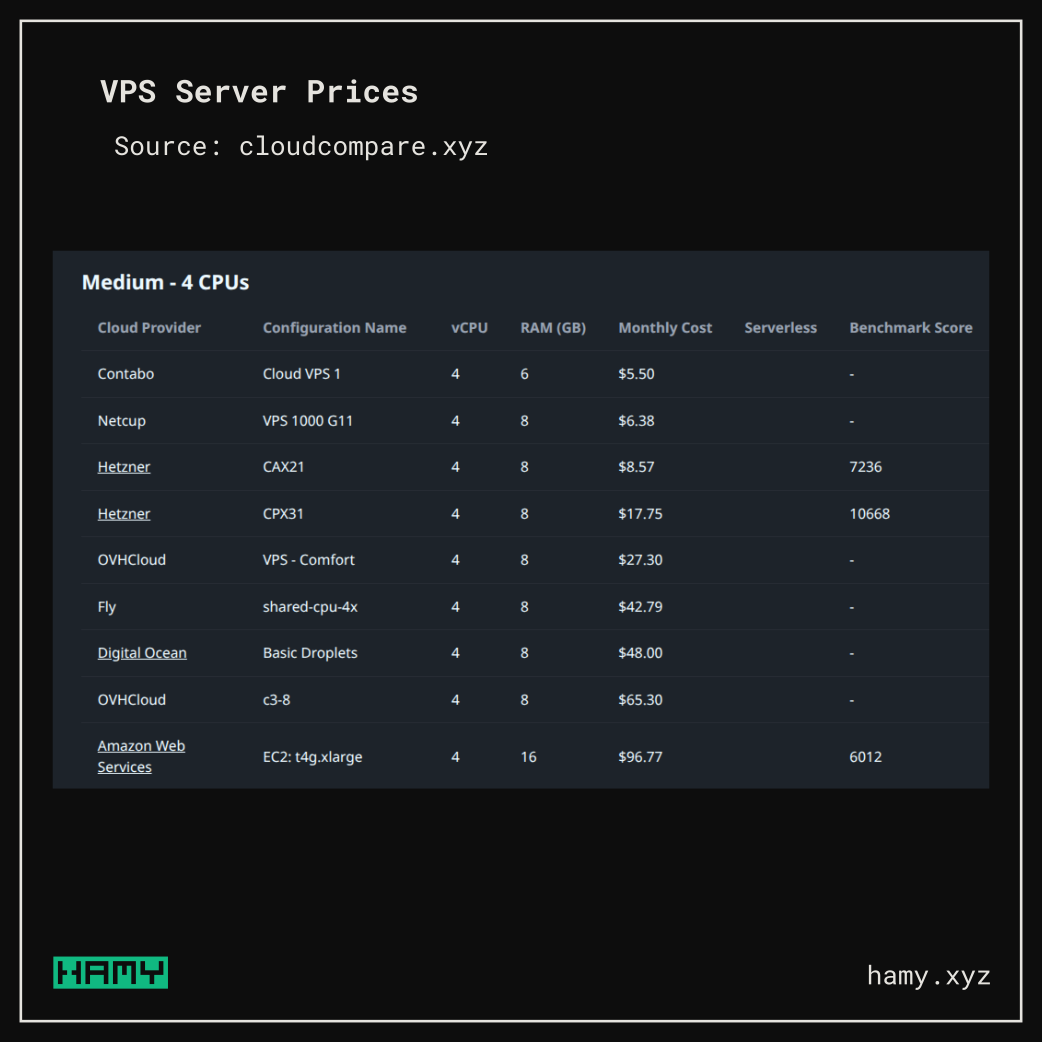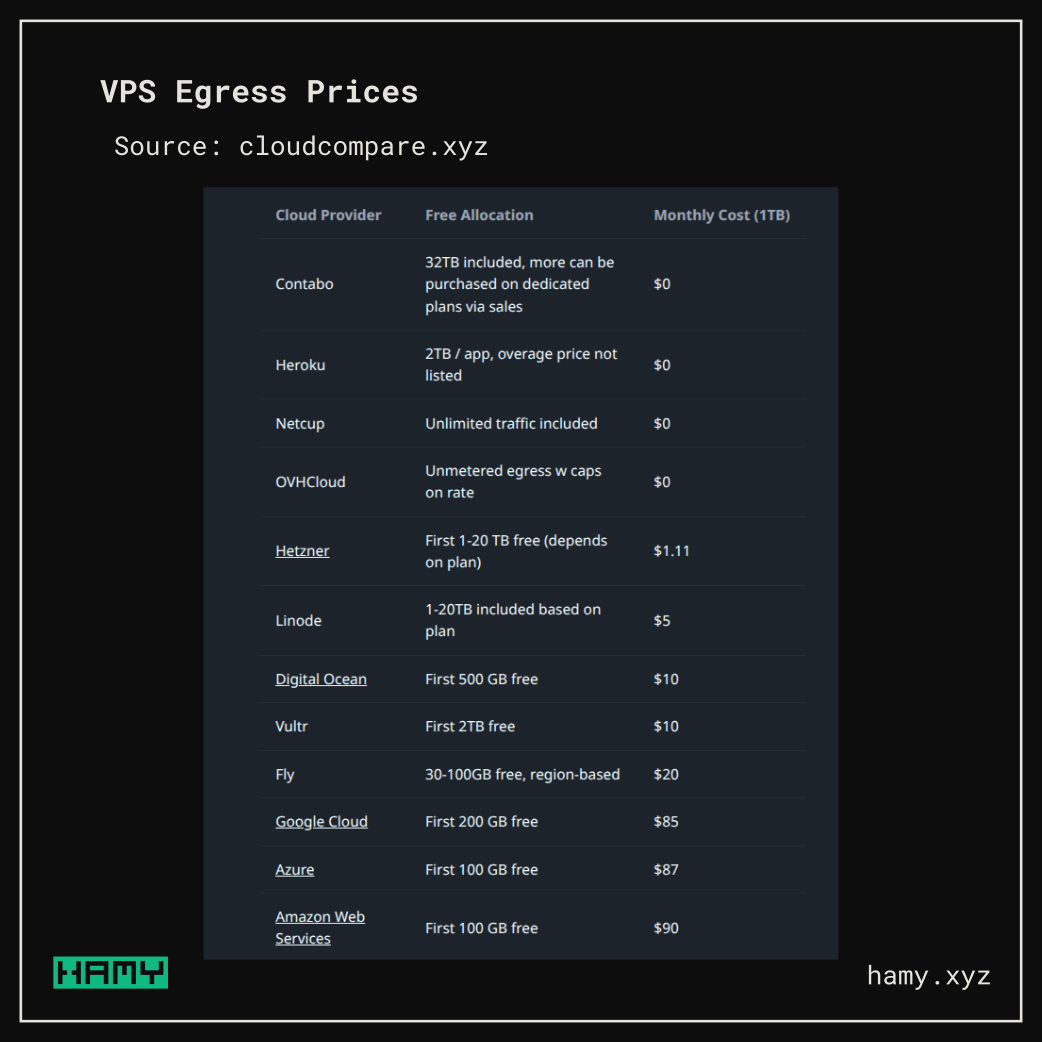What's the Best Value VPS Provider? Price to Performance Ratio
Essay - Published: 2025.08.27 | 5 min read (1,288 words)
aws | azure | build | cloud | contabo | create | digital-ocean | google-cloud | hetzner | ovhcloud | server | tech | vps
DISCLOSURE: If you buy through affiliate links, I may earn a small commission. (disclosures)
I've been running my servers on a VPS for the last year and recently switched over to an Ansible script for configuring my servers and their app deployments. I've done a fair bit of shopping around to figure out what the best VPS for my money is.
I created CloudCompare to help compare the different cloud offerings to make this decision easier. I've recently discussed my recommendations with several people so here wanted to lay out that recommendation so anyone can benefit.
What makes a VPS valuable?
First let's align on our definition of value with a VPS. It typically comes down to a few things:
- Cost - How much money you're paying out of pocket. Why pay $10 when you could pay $5 for the exact same thing?
- Performance - How much hardware / performance you get for your money. Not all hardware is made the same and different configurations of the same hardware can severely impact performance though finding accurate benchmarks for this is hard.
- Reliability - How much uptime you have with that hardware and how fast / helpful support is when you need them. It doesn't matter how good your hardware is if your machine is broken.
We're going to mostly focus on cost with some anecdata on performance and reliability to guide us because accurate benchmarks for these are hard to find and produce. This will give us directionally accurate recommendations with the caveat that there are going to be outliers (good and bad) that we may miss.
The best VPS providers for your money
In general, the VPSes that come out on top for price:performance are:
- Hetzner
- Contabo
- NetCup
- OVHCloud
These generally win out in terms of price for CPU / RAM configurations and their benchmarks typically score favorably and support is generally helpful. They tend to score far better than the big 3 clouds (AWS, Azure, GCloud) as they're closer to bare metal so can offer better prices for the hardware, plus they don't nickel and dime you with add on fees and have MUCH cheaper egress costs.
Comparing VPS server prices
VPS server prices are how much you'll pay for your server over the course of the month. These are often billed hourly so you don't have to pay for the full month if you want to spin up / spin down servers but note that VPSes typically are slower to provision than a serverless offering if that matters to you.

You can see a comparison of server prices for a 4 vCPU, 8 GB configuration on CloudCompare.
- Contabo - $5.50 / month
- Netcup - $6.38 / month
- Hetzner - $8.57 / month
- OVHCloud - $27.30 / month
- Digital Ocean - $48.00 / month
- AWS - $96.77 / month
- GCloud - $144.30 / month
- Azure - $233.60 / month
As we can see our leading clouds are mostly under $10 for this configuration with the big clouds over $100 - that's 10x savings for a similar configuration.
Comparing VPS egress costs
Egress costs are how much you'll pay for data that leaves the cloud. An example would be a user hits your website and you return your webpage to that user. The payload of the webpage leaving the cloud is how much egress you've accumulated. For typical websites this is often pretty light but it can increase exponentially with high traffic / DDOS or if you are serving heavy media like images or videos.

You can see a comparison of egress costs on CloudCompare.
- Contabo - $0 / TB
- Netcup - $0 / TB
- OVHCloud - $0 / TB
- Hetzner - $1.11 / TB
- Linode - $5 / TB
- Digital Ocean - $10 / TB
- Google Cloud - $85 / TB
- Azure - $87 / TB
- AWS - $90 / TB
- Netlify - $550 / TB
As we can see, our top choices come in at $0-1 per TB whereas the big clouds come in at ~$90. That's 90x savings on egress alone.
In general, egress costs and ad hoc usage fees are what ends up financially ruining solo devs who get targeted with DDOS attacks. Here's a cautionary tale of a $100k cloud bill due to Netlify's high egress costs.
Should you run a VPS?
The beauty of VPSes is that you are close to the bare metal server. This means you get more hardware for your money - often netting 10x savings. Going bare metal typically comes with less additional fees - for network usage (egress / ingress), per request fees, additional volumes / object storage, etc.
So for dollar price, it's very hard to beat VPS.
On the other hand, VPSes typically come with less guardrails. It's a private server that you have full access to but you're also in charge of configuring it, locking it down so others can't hack it, and setting up your own workloads. Compare this to cloud / serverless offerings that typically have integrated workload runners and advanced cloud consoles that can help configure your server via GUI (most VPS have this but it's usually barebones like create a terminal, rescue the box, or reflash it with a different Linux distro).
This means that you may be paying a different price - time and effort.
For some, saving on money may make more sense for others saving time and effort might.
Personally I find the server configurations interesting and like the control it provides me so I can setup my servers and app deployments exactly as I want them. So I choose a VPS and I use an Infrastructure as Code tool like Ansible to automate my configurations.
If you don't want to go that low-level, you also have inbetween options where you run your own PaaS (Platform as a Service) to get the experience of a cloud on your own hardware. Some examples include Coolify, Portainer, Dokku, Dokploy, and Caprover to name a few. I personally used Coolify to manage my Docker deploys from GitHub and would highly recommend if you don't want to go the Ansible route.
Next
I've been running my projects on VPSes for the past year and have really enjoyed it. It was scary at first as I had to learn a lot and there weren't any familiar GUIs to help me out but I've become more accustomed to the command line and now find most server configurations easier and more straight forward via CLI / Ansible than the bespoke and complicated UIs most clouds provide.
As for which cloud host I chose - I'm running Hetzner and have had no problems with them. I'd highly recommend and I even got servers from their server auction which further improves my price:performance ratio. Sign up for Hetzner with my referral link to get $20 in free cloud credits.
That said I think any of the top recs here will be fine for most people. Hetzner is known to be a bit shrewd in who they let into the platform so if they deny you, the other top choices will likely work just as well.
If you liked this post you might also like:
Want more like this?
The best way to support my work is to like / comment / share this post on your favorite socials.
Inbound Links
Outbound Links
- Why I'm Ditching Coolify for Ansible for Deploying my Web Apps
- How this Developer’s Side Project racked up a $100k Cloud Bill on Netlify - and 5 ways to avoid the same fate
- Hosting my Docker Container on a VPS with Coolify as a PaaS with GitHub Autodeploys
- How Cloudflare Container Pricing Compares to Google Cloud Run, AWS Fargate, Azure Container Apps, Railway, Digital Ocean App Platform, and Heroku Dynos
